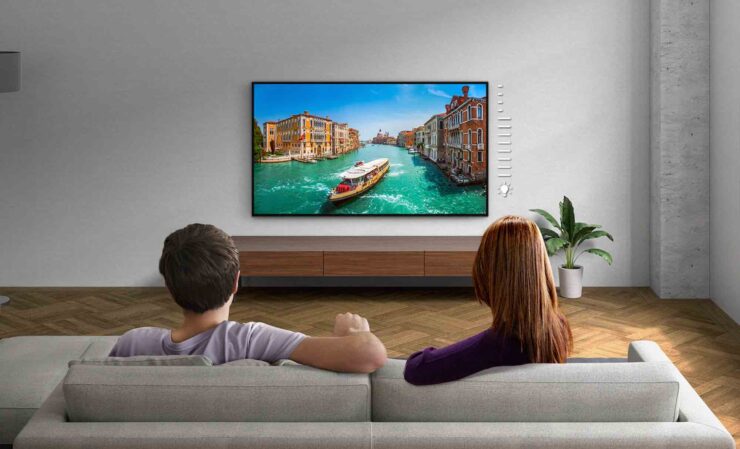Getting a brand-new TV sounds thrilling yet worrisome for some when it comes to making the right purchase. To increase the excitement, and keep the uncertainty at a minimum, experts have suggested considering about five points.
You would be considering getting a new TV before the Super Bowl, however, the information shared in this article remains valid for the entire year and whenever you plan on buying a new TV set.
Before you decide to invest in any TV, you also need a good cable TV connection for it. We recommend Spectrum because it offers extensive channel lineups, free HD, and freedom of choice to curate your bundles along with their high-speed internet and home phone service. Simply contact Spectrum Phone Number to get your hands on a reliable cable TV connection.
Once you have decided which cable TV connection you should get, you can start looking out for a good television set. However, there are certain things that you should look out for in a TV set. Without wasting any time, let’s dive into further details.
The TV set is not something we buy every month but watches every day so a wise purchase is not only going to save you some money but the factors will influence you and your household on daily basis.
So, let’s get started with the important points that we should consider before purchasing a TV.
1. Budget

Even if you like the biggest screen and it fits well in your house at a certain place, it must fit your budget. Thankfully, as the time approaches Super Bowl the all-star deals will elevate.
Last year, Amazon, Costco, Target, and Best Buy were on sale at the end of January, however, TV sales take place all around the year. For instance, in November we have Black Friday which is known for offering big discounts on almost everything including the screens.
Though there would be many other things added to your account for budgeting, such as installations charges, and accessories so don’t just buy the dollar figure as yet.
2. Size
Sometimes people tend to switch TV screens based on the size factor only, but this should not be the only reason as it is going to be a huge part of the decision figuratively and literally. Consumers get a new TV at home but end up wishing they had a larger screen rather. As per popular opinion, TV screens sized 70 inches or above are growing rapidly in the TV industry at the moment.
You should figure out the place you are going to keep your TV screen and the size that will fit best there. While shopping or researching online, you can filter the size, company, and price you want to compare the features, etc. in one place.
3. Connectivity and color

As soon as you have enlisted the selection, you need to think about what you want. If someone is upgrading after a very long time, they should check the latest innovations to see and compare which one goes with their watch list. If someone is buying a TV after 2013 or 2014, a lot has changed since then and not only features but inventions and prices have also altered with new technologies. And as far as all the crucial decisions are concerned, when it comes to LCD vs. OLED, the LCDs that have LED backlights work just fine in brighter rooms, whereas OLED works well with dark rooms dedicated to watching TV.
4. Accessories
Make sure you get any additional equipment you may require after buying the new TV set. Sound is an important component when considering extra equipment with TV. You can easily rely on the basic sound system any TV comes with or add soundbars or audio or video receiver independently to increase the sound. Also, read the “What’s in the box?” to learn if it comes with all the required cables to work properly.
5. Sound quality

Sound quality is an important factor to consider when purchasing a new television. While many of them come with built-in speakers, the sound quality can vary significantly between different models. A good sound system can greatly enhance the viewing experience, making movies, shows, and music sound more immersive and enjoyable.
There are different types of speakers and sound systems available for them, and it’s important to understand the differences in order to make an informed decision. Some of them come with basic stereo speakers, while others offer more advanced systems such as sound bars or surround sound setups. Soundbars are a popular option that offer improved audio quality compared to built-in speakers, and they can be easily mounted on a wall or placed on a tabletop. Surround sound systems, on the other hand, consist of multiple speakers placed around the room, providing a more immersive audio experience.
When considering sound quality, it’s also important to look at factors such as frequency response, power output, and distortion. These measurements can give you a better understanding of the overall audio quality and clarity of a TV’s sound system. Ultimately, the right sound system will depend on your personal preferences, budget, and the size and layout of your room.
6. Ideal installation
Lastly, do plan before bringing the TV home where that is going to be installed. Especially when it comes to placing the TV on a wall mounting in the opposite direction of a TV stand. To inquire about the warranties that come with installation as well – it can bring peace of mind for you if you plan on hanging on a wall yourself.
You should also know how long the delivery process and installation will take along with the charges you will have to pay – particularly if you are ordering online. Once the process of buying is complete, you can then enjoy your favorite shows and Super Bowl and relax as you won’t have to go through this process for at least the next 5 to 7 years again.
Wrapping Up
The TV is not something we buy occasionally and requires a good amount of money to get it home as well. Therefore, it is always recommended to do your research well before buying anything, especially if this is something you would get for at least 4 or 6 years (which is on average when people change their TV sets).

